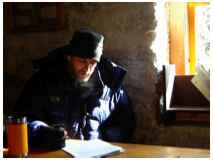Meditation Instruction on Words
While I was prepping for the Mountains and Meditations course, I borrowed a great Insight Meditation CD from Terry Stoecker, who teaches meditation at Proctor. The CD consists of six guided meditations, all of which proved to be really helpful while instructing high school kids on the tricky practice of sitting. On one of the tracks, "Meditation on Body Sensations," Sharon Salzberg has this to say about labeling thoughts:
"You don't have to struggle in any way for the right word. If a word comes to you that is truthful, that bares a relationship to what you are actually experiencing, then you can use it in the same way that you use a mental note for the breath, to support the awareness, to bring the mind more directly into contact with the actual experience."While the word "truthful" makes the post-modern person in me cringe a bit, I thought her elaboration ("bares a relationship to what you are actually experiencing") quantified it enough to make it palatable, and in general, I found this to be a really helpful instruction. I was also left wondering if you might look a Philip Whalen's poetry through this lense, or even the twisting, hard-to-catch writing of Larry Eigner. Might this meditation instruction double as one way of describing their writing process?
In order to get an idea of Whalen's writing process, take a look at this quote of his from A Poets Colloquium panel discussion at Naropa:
“I usually get carried away. I hear some line in my head or see something that attracts my attention or carts me off with it temporarily and I get it all on paper somehow, maybe not all at once, maybe several days later. But it’s an obsessive kind of business. I can’t really say that I create these things, that I sit down with the intention of saying, “Now I’m going to think of a sublime thought,” and presently the sublime thought appears and I say, “The moon is rising over the purple hills.” This is a sublime statement of my sublime thought and you got poetry. With me it doesn’t work that way. Sometimes I get turned on by a single word or by a phrase or by something somebody says on the bus or maybe I’ll be reading something that suggests something else to me, and I take off and start writing my own thing at that point. It isn’t so much a business of my being a professional poet or something or of my seeing myself that way, but just being interested in words and language and having a great deal of fun with it.”Whalen's own description of his practice certainly doesn't lead me to think of a solemn person alone sitting in half lotus, but it also has that light-touch, investigatory nature that is concomitant with meditation practice. And certainly, Whalen, a Zen abbot, was a serious meditation practitioner. Lumping Eigner into this discussion might be a stretch. Aside from anecdotal stories about Eigner's excruciatingly slow, belabored typing, I have never read anything about his actual writing process. However, having attempted quite a few Eigner-esque poems over the years, I'd say this kind of word—experience relationship probably isn't too far off the mark.
Here's one of my early, and possibly favorite, Eignereals:
windthrow couple backing
billow on thick crows
roof ladder
jets
like shooting stars
the average price of frizzy hair
slow motion
Subaru a red maple
at each corn row
“as of yet
no one has
specified
the or else” outside
erupts
in blackbird wings

No comments:
Post a Comment